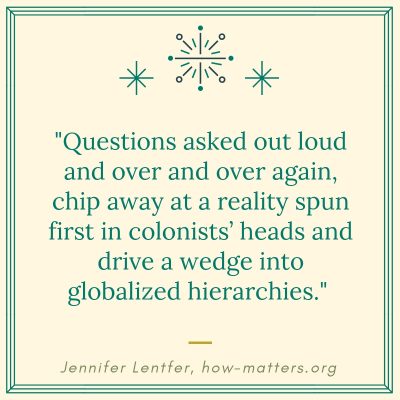Picture it. A banquet room filled with tables of 12 covered in white table cloths, empty plates, and clinking glasses. Murmurs of dying conversations as we took our seats on the platform and got our microphones working.
The topic was motivation and what brings people to the global development and global public health sector. We were talking to a room of people who run global service learning programs and departments across universities in the U.S.
As one of two panelists, I had reflected on my journey (which, eh hmm, began before voluntourism was a word) and was prepared and ready to talk about the continual personal evolution I believe is necessary to be effective as international “do-gooders,” especially for white people with educational and class privilege.
I should have known my fellow panelist did not think that necessary at all.
I should have known when she arrived, her brown, straight hair braided by the three young West African women who accompanied her. She infantilized them, referring to them as “my girls” to whom who would occasionally wave to or make faces at them during the panel and Q&A.
I should have known when at the table, before we took the stage, she referred to the groups that my organization funds as “those activists who don’t ‘get in’ because they don’t know how to talk to policy makers.” Whoa. And what?! (And if you know anything about our partners, that is certainly not true. Here’s just one case in point.)
The moderator who had invited me on the panel set us up well with the questions we had devised prior. Despite us both being white women, clearly the panelist and I had divergent points of view and lived experiences in our sector. So I decided to stick to my talking points and let the chips fall where they may.
Early on, as I first made my case for learning amidst discomfort, her response to my input when it was her turn was, “Well, I’m the least reflective person I know.”
I should have known.
One of the questions we had devised prior was about failure. Without a lick of self-reflection (perhaps she was right), she announced her surprise when she once discovered that the guard of her home (the person likely paid to sit in a small shack outside of the automated gate) had a baby who was wasting. This happened as she was working on a big child health research project. She hadn’t noticed the sick child in her midst. Her empathy for the parents was far from palpable as she told the story, absent in fact.
Every time she spoke, her privileged, globe-trotting, imperialist roots pranced across the stage. The moderator, by now so shocked by story after story reflecting the fellow panelist’s superiority, went fairly silent, not knowing what to do.
I carried on, just staying focused on my message and making an active choice not to turn this “friendly” post-supper conference chat into a debate. Amidst the name-dropping of all-star “outsiders” like Paul Farmer and Jeffrey Sachs, the fellow panelist claimed to have worked “outside of development institutions” as I tried to tell stories that showed the fundamental inequities at the core/founding of the global development and global health sectors.

Eventually, I decided I had to problematize her narrative. I couldn’t let this go on unchecked. When she claimed again to have been working outside the aid system because she as a researcher was working with governments, I’d had enough of the pretense. So I asked her to justify why wouldn’t the best outcome for the Nigerian Ministry of Public Health be to call upon “experts” like herself from within Nigerian universities. Wouldn’t Nigerian researchers know better the context and shouldn’t they have the chance to use their capacity to conduct to such studies internally? Didn’t the government’s choice to work with her illuminate deeply held biases and remnants of colonialism that still remain?
I tell this story because we all know a version of this person – someone beholden to and upholding institutions and programs and ways of working that no longer serve us. These people need to be asked questions like these. Questions asked out loud and over and over again, chip away at a reality spun first in colonists’ heads and drive a wedge into globalized hierarchies.
My fellow panelist, someone who managing a new multi-million dollar, major university-based research initiative on global development, needed to at least be asked. I don’t remember her answer, but I do remember my face displayed that I was at once disappointed and not surprised by it.
She should have known.
Related Posts
Moving along on the do-gooder journey
Wrestling with my white fragility
The invitation: This is what it feels like (Part II)
Does aid need a 12-step program?
A new kind of aid donor: Four things they do differently
The thing about solidarity is…

